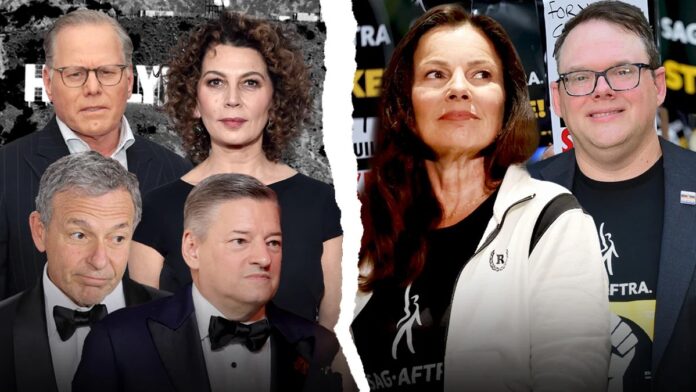It shouldn’t have come to this. After five meetings over 10 days between four of Hollywood’s top CEOs and the leaders of the Screen Actors Guild, it was supposed to be down to the wire for a deal.
Instead, SAG-AFTRA President Fran Drescher touched a frayed nerve with the CEOs, principally Warner Bros. Discovery CEO David Zaslav, according to multiple insiders who spoke to TheWrap.
The guild had returned to the negotiating room at SAG headquarters in West Hollywood with a new ask: Instead of demanding a 1% levy on all streaming revenue, the guild was demanding a flat $1 per subscriber, per year fee.
This was an unusual first-dollar revenue share regardless of profit or any individual contributions to the success of any show, much less a company. The money would go to the guild itself rather than individual actors on any show — and the union would decide how to distribute.
The CEOs had already rejected the idea of revenue sharing in principle as untenable for their business model. But in their view, it was back.
“On what basis would you do that?” Zaslav pressed.
Drescher deflected. “Think how much better actors’ lives will be,” she said.
And she said what the CEOs took to be a threat: that if she did not get this benefit for her members, it would be back to the strike lines for all. SAG-AFTRA has been on the picket lines since the strike began, but the threat seemed to indicate a robust showing along the lines of the vociferous presence of WGA members throughout the summer.
This subscriber proposal made no sense to CEOs Zaslav, Disney CEO Bob Iger, Netflix co-CEO Ted Sarandos and NBCUniversal’s Studio Group Chairman Donna Langley. They felt they had already offered significant raises to actors in their negotiations up to that point, and that a flat levy to the guild on their subscription revenue was, as Sarandos later put it, a bridge too far.
They also worried they’d need to give a similar deal to other guilds, which would cost even more in a portion of the industry – streaming – where most studios are losing money.
It was an economic model they could not accept.
After they left the negotiating room, all the studio heads agreed that they were done talking.
“We’re not a socialist country,” said an individual on the studio side. “We said, ‘This is crazy.’ It made no sense.”
TheWrap spoke to insiders on both sides of the negotiating table, and both agreed that the breakdown was over this deal point, even though there had been constructive negotiations between the principals for days that was supposed to lead to what both sides had hoped would be “closeout proposals.”
It wasn’t to be.
Negotiations were scheduled for the following day, Thursday, Oct. 14. Instead, within a couple of hours, the Alliance of Motion Picture and Television Producers, the eight companies that represent the major studios, issued a statement that they were suspending talks because the gap between the two sides was “too great” to bridge.
And in a move that mirrored one that backfired in August in talks with the WGA, the AMPTP released the details of their proposal to SAG-AFTRA to the public. The move was perceived as a gesture aimed at circumventing guild leadership and prompted accusations of bullying.
In an interview with TheWrap on Thursday, SAG-AFTRA chief negotiator Duncan Crabtree-Ireland said the new proposal that became a sticking point was their attempt to offer something different after the guild realized that the studios were “never ever going to agree to anything that involved attachment to their revenue stream.”
“Our committee did some soul searching and came up with a revised proposal not attached to revenue stream, but attached to viewers and subscribers. I thought it was going to be more palatable to them,” he said, adding that he “fully expected” them to accept the new model.
In their statement issued on Wednesday evening, the studios said the cost of this levy would amount to an additional $800 million a year. Crabtree-Ireland countered that characterization and said the new proposal actually comes to 57 cents per subscriber, not $1, after removing non-SAG shows (like reality and international content) from the equation.
On the studio side, an insider disputed that these nuances were presented in the negotiating room, insisting that the stated fee would be $1 per subscriber per year.
“They have either intentionally or non-intentionally misconstrued the cost of the proposal,” Crabtree-Ireland said. “I told them how and why [Wednesday] night and they decided to leak that incorrect valuation in their press release. The correct valuation is about $500 million – a little bit less than 57 cents per subscriber per year. Less than a postage stamp per year per subscriber is not that much of an ask.”
Drescher also expressed surprise that the studios cut off negotiations.
“It really came as a shock to me because what does that exactly mean and why would you walk away from the table? It’s not like we’re asking for anything that’s so outrageous,” Drescher said to NBC on Friday.
A spokesperson for SAG-AFTRA declined further comment on Sunday.
A spokesperson for the AMPTP declined to comment for this story.
Either way, the tension between Drescher and the CEOs– much more so, it appears, than with chief SAG-AFTRA negotiator Duncan Crabtree-Ireland – inserts a personal element that now needs to be overcome.
“She’s holding up the whole industry,” said the insider on the studio side. “We left. I don’t know if we’re coming back anytime soon.”






